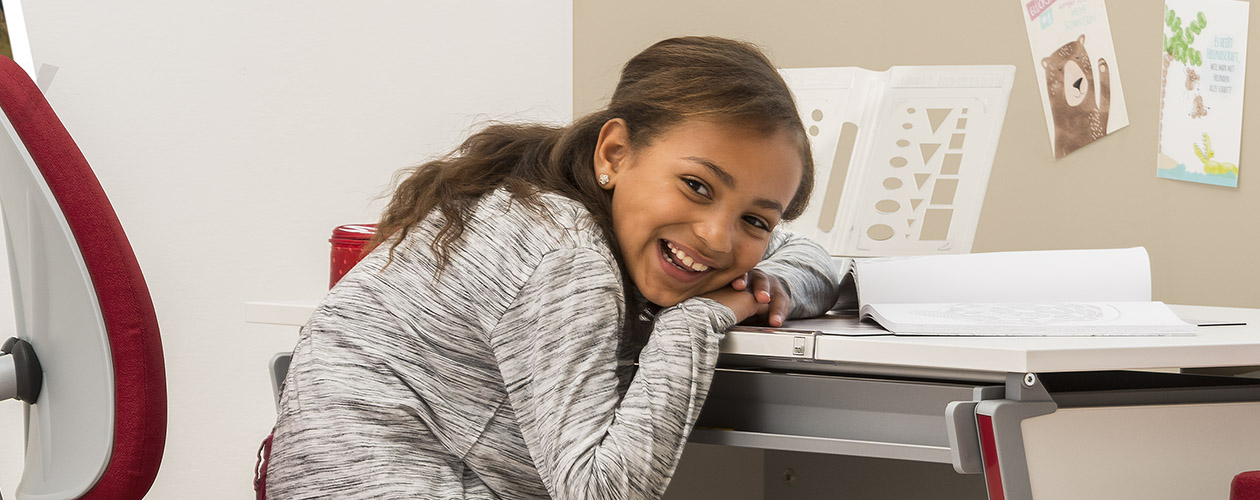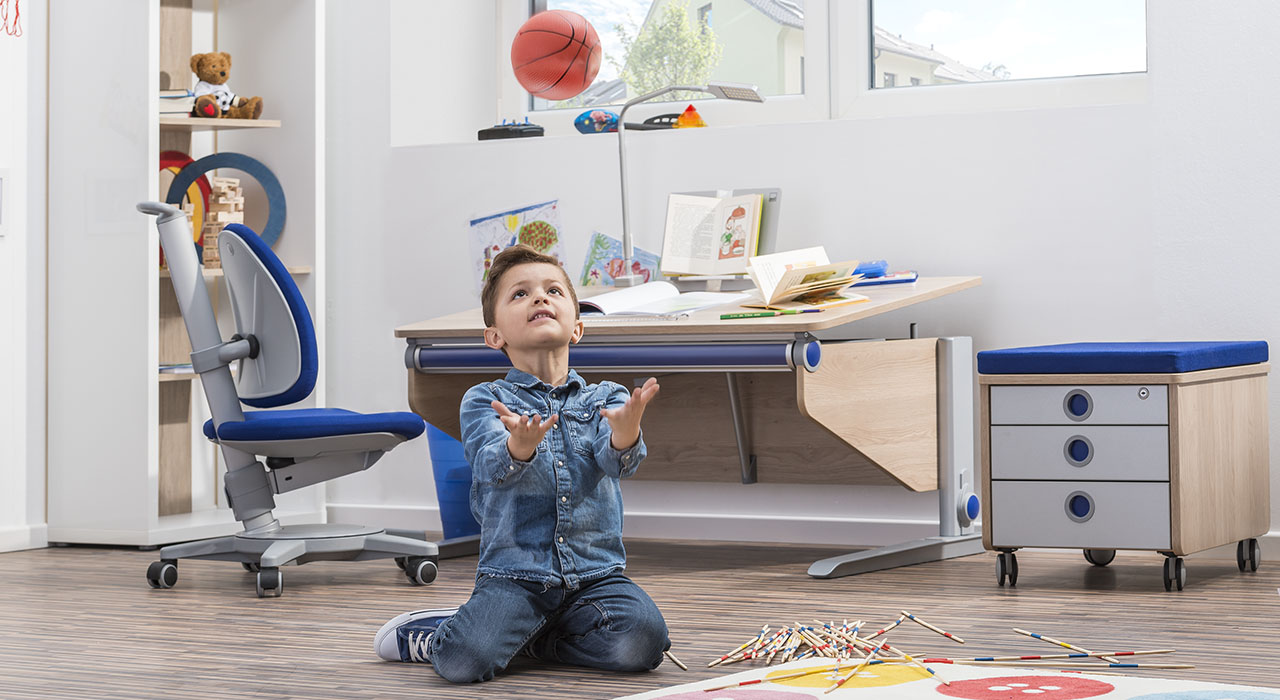How do I motivate my child for the start at school?

School enrolment marks the beginning of a new stage in a child’s life. The first homework and later also the first class tests present the child with new challenges. In primary school, many impressions of the day still sound when the child arrives at home – and the food makes sluggish at first. After lunch, it is good to switch off and rest for a while. About 60 to 90 minutes are enough for playing, painting, or even just looking into the distance.
When the homework has to be done, it is often hard to get back into work mode. We are giving some important tips and information on how the right motivation supports your child.
How to start with the homework
Especially for first graders, homework is new and it takes time to adjust to it. But even older children have to be able to switch from playing to doing their homework. Of course it’s good to start with the easy part of the homework. If it is difficult to get started, a little “thinking game” or a concentration exercise can be done for a successful start to homework. It is important that they are fun and allow the child a smooth transition from play to homework.
For example, Loewe Verlag offers a card learning game series called “Clever Spielen,” which provides a suitable introduction for every child at every age group. These are card games that are fun and strengthen the ability to concentrate and remember. Even preschool children can practice their concentration and memory skills by playing this game. The cards are neatly decorated with funny pictures and are easy to pick up! This motivates children and makes the transition to starting the homework a lot easier.
How do I motivate my child?
At play, the child can learn how satisfying success can be when he or she has worked really hard. A candy as a victory bonus at a game is much more valuable than a candy that the child simply gets from grocery shopping. The satisfaction of winning will motivate the child in the future. If a child does not experience this feeling, there is also no incentive to tackle new targets.
The same goes for homework and learning. But it doesn’t have to be a physical reward like candy – motivation through recognition is much more important. If a child receives a good grade, this sense of achievement should always be seen in connection with the child’s efforts. It should be emphasised that learning and preparation have laid the foundation for the achievement. In this way, the child understands the connection between active learning and success. This can motivate children to continue their efforts in the future! A teacher’s praise for well done homework is valuable, lasting and ensures a feeling of pride and satisfaction. Success encourages new successes and will motivate the child in the future to receive further praise. In general, motivation is an essential factor for successful learning. If a child wants to know something and is interested in a topic, he or she will want to learn more about it
How setbacks can be avoided?
Genuine praise and recognition for one’s own achievements show a child that his or her ambition has paid off. In order to motivate the child, care should be taken to ensure that regression is a normal part in the developmental process of children and also belongs to it. Also, parents have to be patient to motivate the child. The joy of small successes is important! Comparing the performance of different children creates unnecessary pressure. The differences between children are great and the same standards cannot be applied, as each child is individual and has their own strengths.

The “Top 10 Homework Tips” from moll
In addition to the ergonomically sensible learning place, the following tips support parents and children for a stress-free afternoon:
- Before the homework starts: A healthy lunch and some rest afterwards are important.
- Agree on a fixed time: Do not allow more than 30 minutes for first graders.
- Keep your desk tidy – drawers, containers and add-on elements provide the necessary storage space.
- Provide calm without distraction: learning is better without playing siblings in the same room and with your mobile phone, radio and television switched off.
- Promote independence: First of all, children should be encouraged to solve the tasks without the parents´ help. If the child does not make any progress, the parents may surely be asked to help.
- Motivation and sense of achievement: start with the easier tasks.
- Sometimes the task sounds complicated to the child. Parents should explain the task in understandable words.
- Get to the bottom of difficulties together: If the complete learning content is not understood, the teacher should be consulted.
- Have similar tasks ever been solved before? This gives the child the chance to compare.
- Short breaks between homework provide new strength. For example, movement exercised during the breaks revive, increase the ability to concentrate and provide relaxation. Simple and effective movement exercises can be found here.

How can my child be motivated to learn and practice?
1. The child should try the homework without help at first before parents offer their support. The parts that the child has already solved should be appreciated.
2. Support the child’s urge to explore, even if it creates disorder or untidiness. As long as nothing is damaged, a child should be allowed to live out his or her ideas and get to know limits.
3. Praise the content, even if the form leaves something to be desired! Error-free homework doesn’t always have to be written super neatly. The not very legible writing can still be discussed later.
4. Be open to creative and unusual solutions. Why shouldn’t the child practically “replay” certain text tasks, for example, tasks with quantities or units?
Why is the time after learning so important?
Common sense tells us humans that the time of “active learning” is particularly important for the permanent memorization of facts and contexts. However, research is increasingly coming to the conclusion that the time after learning is much more important – the time when we are not sitting at our desks but instead doing something else.
Why does one learn during the time after active studying? This can be explained as follows: When learning, the new content is first brought into short-term memory, where it remains for minutes to hours. The content is stored on the synaptic level to be transferred from there to the system level. This requires consolidation, i.e. consolidation of what has been learned. This consolidation of the learned knowledge can be supported by rest, sleep or relaxation exercises.
Why does the brain need rest?
For children, this means that computers, mobile phones and televisions should be switched off for a certain period of time after learning in order not to overstrain the brain emotionally and mentally. This is exactly what happens in media consumption.
It is therefore crucial for the permanent memory of new content that the brain is not immediately overwhelmed with new impulses. If necessary, the child should take a little nap, because during sleep the brain processes and solidifies the numerous impressions and information it has taken in. Meditations and relaxation exercises can also support the brain in learning. If the child has a great urge to move, individual yoga exercises or a walk in the fresh air, for example to the next playground, can support the brain in consolidating what has been learned.
Learn more tips on school enrolment from our guide for first graders …..
…. with tips for the time before school enrolment
Learn more tips on school enrolment from our guide for first graders …..
…. with tips for the time after the 1st day of school
